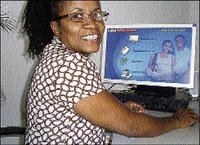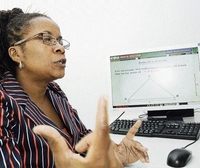
Elaine Peck Elaine Peck demonstrates EPAVE Mathematics. - Rudolph Brown/Photographer
It took 10 years and $40 million to be completed, but on November 19, Elaine Peck launched the project
Peck is chief executive officer of CPA Technologies Limited, an offshoot of EPA Computer Services Limited, a research and information-systems
In achieving her pet objective
The money has come from friends, family, loans from National Commercial Bank, Bank of Nova Scotia Jamaica, McKayla Financial Services and the National Export-Import Bank of Jamaica, which helped with restructuring loans as project completion approached.
Now that EPAVE has been launched with the first 10 modules of the CXC syllabus available on one CD and on the Internet (www.epatech.com.jm), the entire series
Some 40 experts were employed to design and complete the project for which head content writer was mathematics teacher Brian McLean.
Wide range of services
McLean's credentials include a degree in economics and statistics, 30 years of teaching mathematics, the composition of a
EPA Technologies, previously EPA Computer Services Limited, was initially formed to provide research, desktop publishing, computer consultancy, database management, computer training, technical information and library services to clients.
Today, the range of services offered includes software development, preparation of educational content for electronic learning, design and development of virtual learning environments, online classrooms, training in information technology, interactive media and computer graphics.
Peck emphasised that the network of 40 employees and consultants within the organisation provides high levels of technical skills to formulate solutions for clients.
EPA Technologies, Peck states, will use its virtual educator software applications to achieve its medium-term e-learning objectives.
Peck is pleased that the company
Come a long way
The innovator has come a long way. Having attended Clarendon College, Excelsior Community College and the College of Arts Science and Technology (CAST), now University of Technology, Peck said that she had always been involved in computer education and information, with her first diploma being in library studies. Between 1988 and 1991, she completed training in computer studies at CAST.
Before starting EPA, Peck
She has been
She spent two years in Ontario, Canada, providing computer training services for the Harambee Foundation, which provides help to the unemployed.
Peck said it was following successful participation in various projects that she decided to focus on the development of CAE products aimed primarily at Jamaica and the English-speaking Caribbean markets.
"I have always been fascinated with technology. Based on the poor CXC CSEC results over the years, in June 1996, I had an idea to use technology to improve the quality of education in Jamaica and the Caribbean."
At that time, she said,
"I was told several times that Jamaica was not ready for this, and that maybe I should consider seeking funding from overseas. It was very difficult to get funding, or investors to come on-board.
After trying relentlessly for many years,
$3 million start
"One day he told me that if after 10 years I was still talking about it, it must be something good. He came back with some money in two days."
The amount was $3 million. It was a relatively small start, which snowballed as Peck poured her energy into convincing others to invest.
"I was fortunate to come across individuals who shared my vision. These individuals came on-board, some offering technical skills, and others investing money. We began an exciting journey into virgin territory. In many ways we were pioneers as there were not many local examples of what we were attempting to do."
By the time Peck and her friends ran out of money, they were fortunate to have reached a stage where the product could be demonstrated.
At that point, several financial institutions
Peck stuck with the field of education because, she believes, "one of the most important uses of technology is to improve education".
"In our everyday life we see how education can transform individuals, communities and a nation.
In all, Peck and her team, based at the UTech Innovation Centre, have completed a quiz CD for mathematics, which is based on the questions covering all subject areas in the CSEC syllabus,
Now that the math product is ready to roll, with the next CD
But, once that hurdle has been crossed, Peck expects that business based on the product would be forthcoming.
"In the near future,
avia.collinder@gleanerjm.com


Elaine Peck of EPA Technologies speaks about EPAVE Mathematics, at the Technology Innovation Centre, University of Technology, on Wednesday, December 16. - Rudolph Brown/Photographer